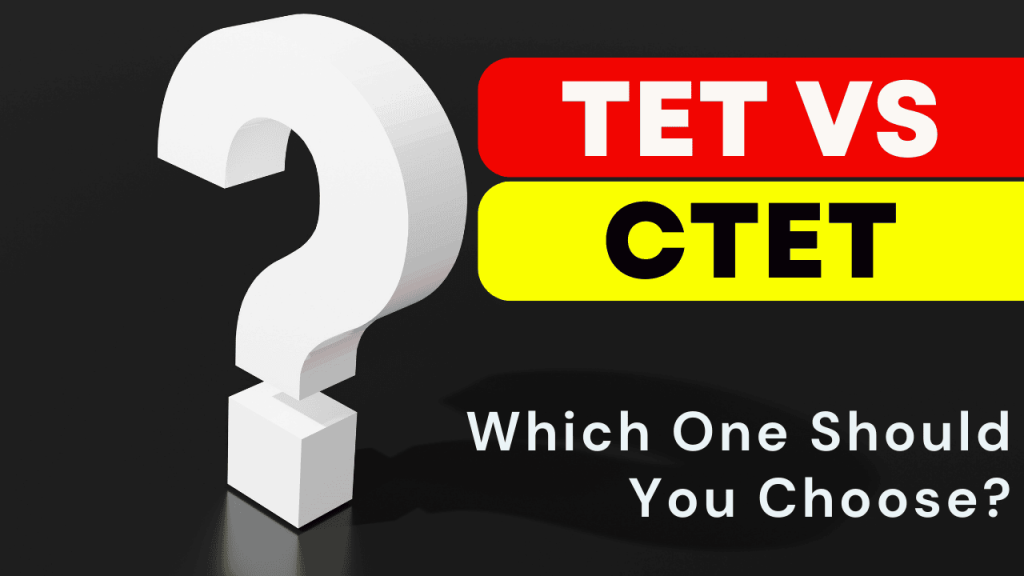
The students who want to become teachers in India need to have essential qualifications such as a graduation degree, master’s degree, DED, BED, etc, and along with these degrees, it is required to have the TET certificate or CTET certificate. This certificate acts as a teacher eligibility certificate for the teaching job and makes you eligible to apply for the teaching job, mainly in government schools.
What is TET?
TET stands for Teacher Eligibility Test. TET is conducted by each state and the name of TET depends on the state name, such as for HTET (Haryana TET), UPTET (Uttar Pradesh TET), and MAHA TET (Maharashtra TET). The qualification is required for teaching Classes 1 to 8 in state-run schools. The syllabus and pattern may differ slightly from state to state for the TET exam.
The certificate validity depends on the state rules, usually with lifetime validity. The exam is held once or twice a year, depending on the state. Currently, most states have made the TET a lifetime valid certificate means you need to pass the exam only once.
What is CTET?
CTET stands for Central Teacher Eligibility Test. The Central Board of Secondary Education (CBSE) conducts CTET at the national level. The exam is necessary for teaching in Kendriya Vidyalayas (KVS), Navodaya Vidyalayas (NVS), and other central government schools. It is also accepted by some private schools and state government schools. The qualification is valid for teaching Classes 1 to 8. The certificate validity is lifetime. The exam is conducted twice a year.
Differences Between TET and CTET
| Feature | TET (Teacher Eligibility Test) | CTET (Central Teacher Eligibility Test) |
|---|---|---|
| Conducting Authority | State Government | CBSE (Central Government) |
| Coverage | State Level | National Level |
| Schools Applicable | State Government Schools | Central Government Schools, Some Private & State Schools |
| Eligibility | As per State Rules | As per National Rules |
| Exam Frequency | Once or Twice a Year (varies by state) | Twice a Year |
| Certificate Validity | Lifetime (in most states) | Lifetime |
| Difficulty Level | Varies by State | Generally Higher |
| Language Options | Regional Languages & English/Hindi | Hindi & English |
| Application Mode | Online/Offline (varies by state) | Online |
Which One Should You Choose?
Choose TET if you want to become a teacher in state government schools. You prefer teaching in your home state. You want an exam with a moderate difficulty level. You are comfortable with the state syllabus and regional language options.
Choose CTET if you want to work in central government schools like KVS, NVS. You are open to teaching anywhere in India. You aim for better job opportunities, including at private schools. You are prepared for a more competitive exam with a national-level syllabus.
Exam Pattern for TET and CTET
Both exams have two papers: Paper 1 is for teaching Classes 1 to 5. Paper 2 is for teaching Classes 6 to 8.
| Subjects | Paper 1 (Primary Level) | Paper 2 (Upper Primary Level) |
| Child Development & Pedagogy | 30 Questions | 30 Questions |
| Language I | 30 Questions | 30 Questions |
| Language II | 30 Questions | 30 Questions |
| Mathematics | 30 Questions | (Math & Science) OR (Social Science) – 60 Questions |
| Environmental Studies | 30 Questions | Not Applicable |
| Total Marks | 150 | 150 |
Eligibility Criteria
| Criteria | TET | CTET |
| Minimum Qualification | Graduation with D.El.Ed or B.Ed | Graduation with D.El.Ed or B.Ed |
| Age Limit | No Specific Limit | No Specific Limit |
| Attempt Limit | No Limit | No Limit |
Validity and Career Scope
The TET Certificate is mostly valid for a lifetime, but some states may have different rules. The CTET Certificate is valid for a lifetime across India. Career opportunities: CTET opens more opportunities at the national level, while TET is limited to a particular state.
Job Opportunities After TET and CTET
| Exam | Job Opportunities |
| TET | State Government Schools, State-Aided Schools, Private Schools (in some cases) |
| CTET | Central Government Schools (KVS, NVS, CBSE Schools), Private Schools, State Schools (in some cases) |
Salary Comparison
| School Type | Average Monthly Salary |
| State Government Schools (TET) | Rs 30,000 – Rs 60,000 |
| Central Government Schools (CTET) | Rs 35,000 – Rs 70,000 |
| Private Schools | Rs 20,000 – Rs 50,000 |
End Notes
Choosing between TET and CTET depends on career goals. Like where you want to do the job, if you are choosing the govt schools in a state, then go for the TET exam of that state; otherwise, go for the CTET exam and prepare for the KVS, NVS/other schools.
Essential Answers
- Can I apply for both TET and CTET? Yes, you can apply for both exams. Many candidates appear for both to increase their job opportunities.
- Is CTET tougher than TET? Generally, CTET is considered tougher because it follows a national-level syllabus and has a higher difficulty level compared to some state TET exams.
- Does passing the CTET or TET guarantee a job? No, passing the exam makes you eligible for teaching jobs, but you still need to apply for vacancies and go through the selection process.
- Can I teach in a private school with a CTET or TET certificate? Yes, many private schools accept CTET and TET certificates, but it depends on the school’s recruitment policies..









